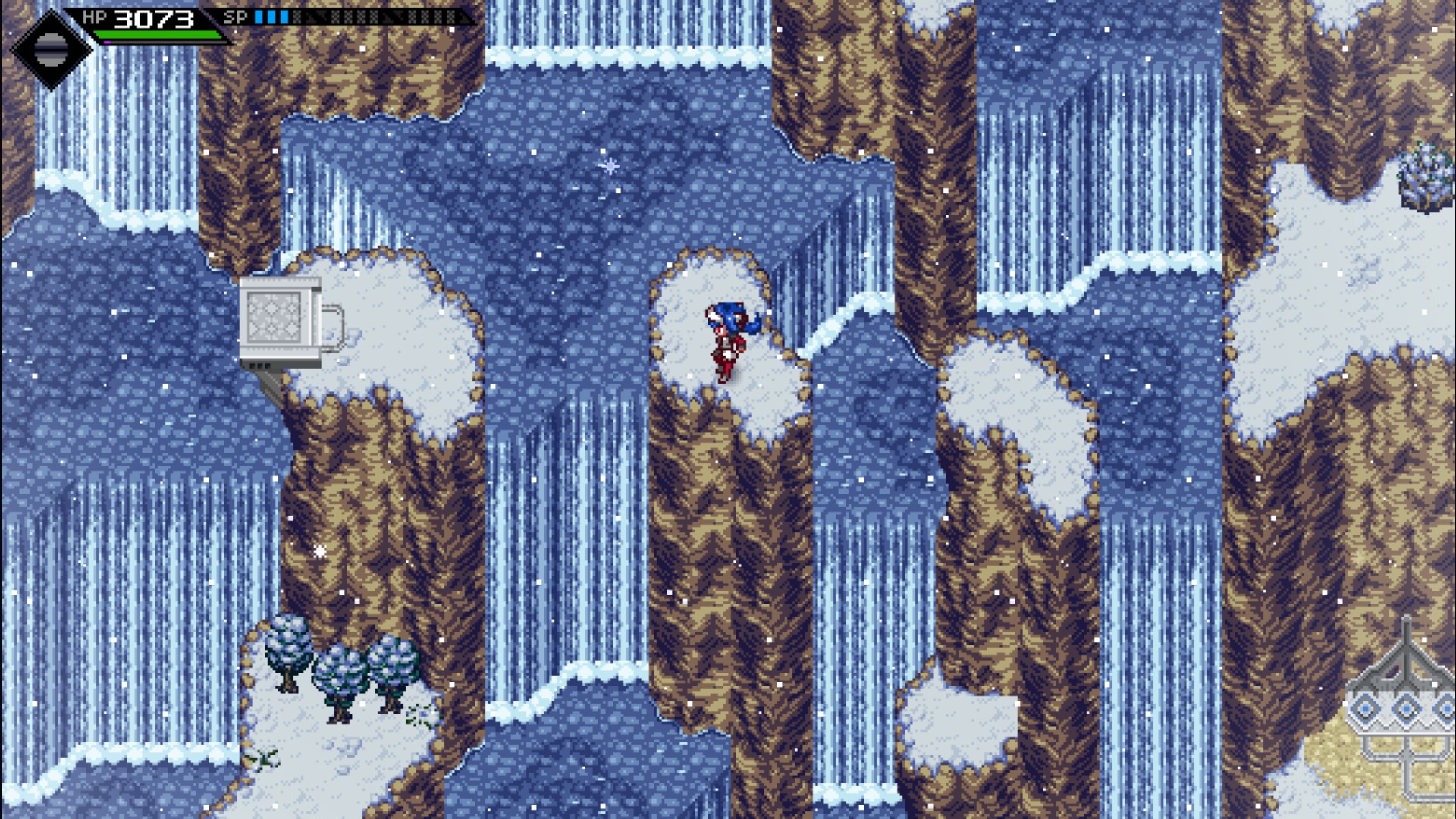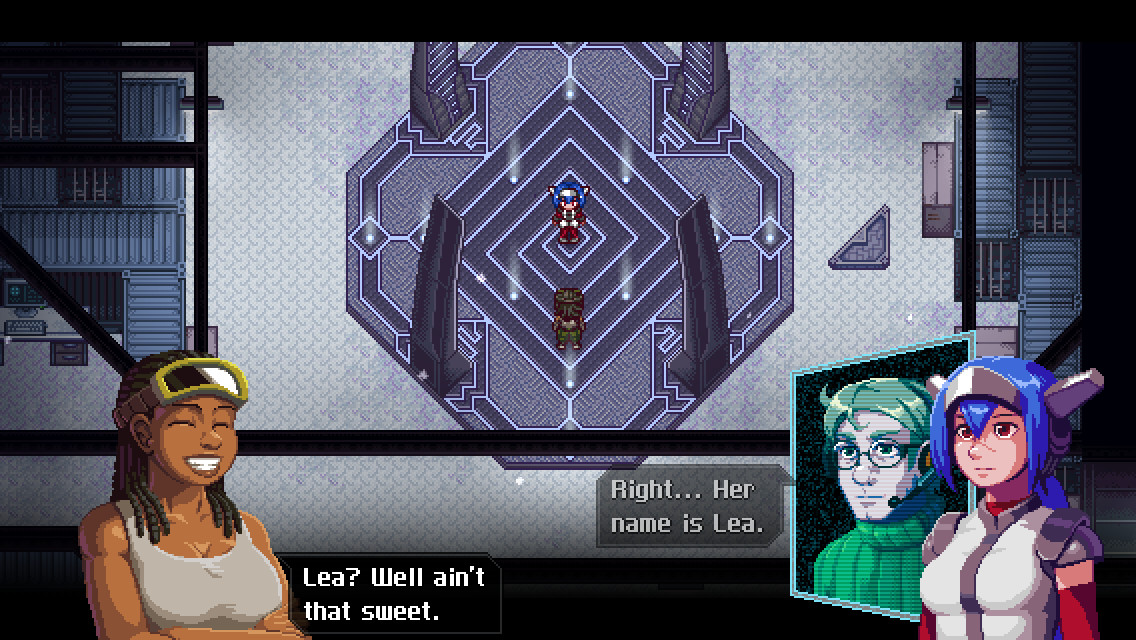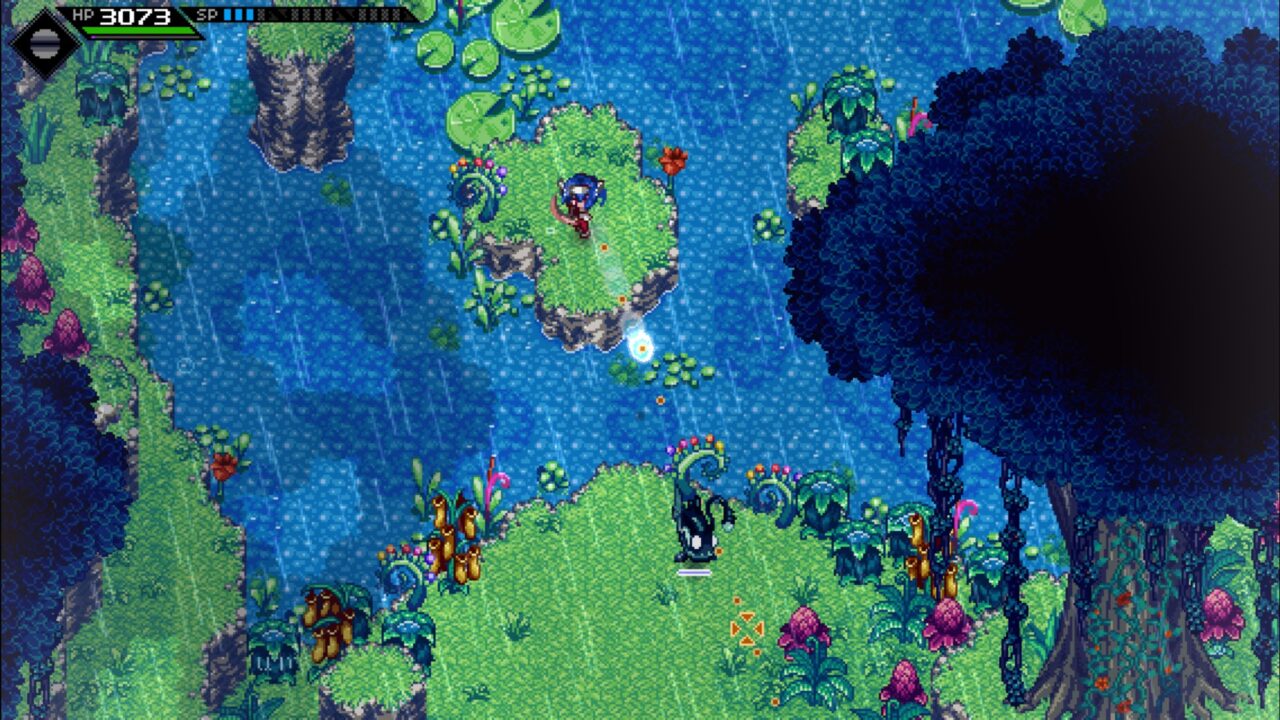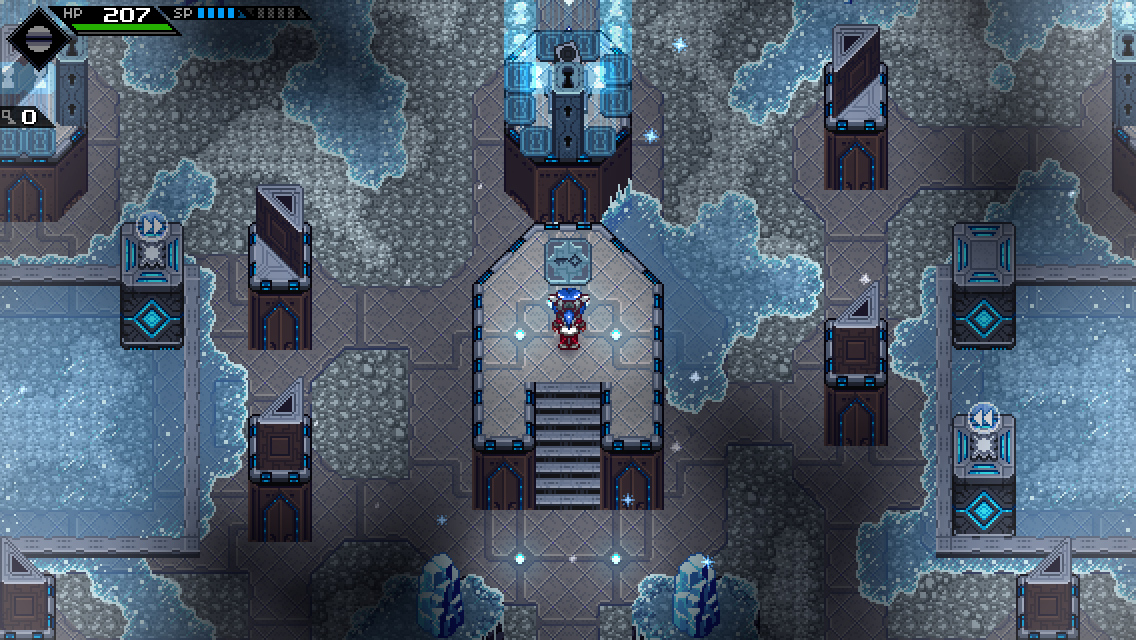See the video version of this review at the end of this page!
Which do you prefer in a role-playing game: a single-player experience or cooperative MMORPG?
While I’m primarily a single-player gamer, I can certainly see the appeal of MMOs. There is something wonderful about the idea of exploring a fully realized fantasy realm with friends you’ve made around the world. That social aspect of MMOs is something that just can’t be translated into a single-player RPG, right?
But what if you could combine the two? Consider the following option: a single-player action RPG set WITHIN a futuristic MMO. That’s the conceit behind CrossCode, which successfully attempts to marry the best of both worlds.
In CrossCode, you are Lea, a player of the incredibly popular massive multiplayer game CrossWorlds. She awakens inside the game with amnesia, not knowing how she logged on or how she can log out. With the help of a mysterious hacker who is in constant contact with her, she begins to uncover her own mystery alongside the storyline of the MMO itself. Developing strong friendships with her fellow players along the way, Lea eventually stumbles upon a massive conspiracy that could spell the end of CrossWorlds. It might even explain the origins of her amnesia.
Who could have guessed that the landscape of an MMO would make a fantastic setting for a single-player game! There are instances, massive amounts of lore to uncover, and hundreds of other “players” running and jumping around like maniacs, enjoying their own adventure in CrossWorlds. You should also keep in mind that, because the entire game is taking place in an MMO, some of the characters you meet might not be who they appear to be. After all, everyone is an avatar!
Though the game is taking place in a modern MMO, the in-game graphics and sound are pure SNES! The 16-bit-style graphics harken back to the final days of the SNES, with impeccable pixel art used for characters and environments alike. The music replicates the feel of classic 16-bit RPG soundtracks, pulling you deeper into the world with each new track. If you’re a fan of pixel art and MIDI soundtracks, CrossCode is a feast for the eyes and ears.

The environments in CrossWorlds are colorful, massive, and filled with secrets. Early on, the game introduces you to parkouring around the maps and jumping from platform to platform, trying to reach greater heights in search of puzzles and treasure chests. Occasionally, you will find that you don’t have the right key to open them, but that’s no issue because you can active shortcuts to the chests after you finish these fun parkour challenges. It can sometimes be a bit frustrating to find the first step up to the next level on a screen, but if you ever see a chest, you bet you can reach it somehow.
In the grand tradition of silent RPG protagonists, Lea can’t speak a word at the beginning of the game. But unlike in other RPGs, they actually give her a reason: her voice module is malfunctioning. This offers a plausible, “real world” explanation for being mute, and leads to some of the more amusing moments in the game. Eventually, she gets pre-programed words put into her vocabulary that allow her to say her name, “Hi,” “Goodbye,” “Thanks,” “Why,” and other simple statements and questions. The expressiveness of her character portrait combined with clever use of her limited dialogue makes her an absolute delight of a character. When it comes to Lea’s characterization, less really is more!

Unfortunately, one of the weak points of CrossCode is how it handles Lea’s journey. Though the game authentically emulates the world of an MMO, your immersion is limited because of the central conceit of the game. You aren’t actually playing an MMO, you’re playing a character who is playing an MMO. This reduces the dramatic tension to near zero because, the vast majority of the time, you know that you and your friends are in no real danger. If you die, you immediately respawn with no penalty. The end result is that two thirds of the game feels like it doesn’t really matter.
Thankfully, that remaining third offers some incredibly compelling science fiction, and a plot that puts Lea through the ringer. Frankly, after everything she goes through, she deserves some playtime mindlessly cutting down bushes and being chased by electric cats.
CrossCode plays like a mashup of Secret of Mana and The Legend of Zelda. When you are in the overworld, you’re in full Mana-mode. You can have up to two AI-controlled friends accompany you in your party, assisting you in beating up the various animals of CrossWorlds. Doing so will net you experience points, but there is another reason to fight them. The more enemies you beat, the higher your gauge rises. By chaining together attacks and never letting the gauge empty, you will receive rarer items from your defeated foes. Reaching an S-rank and collecting countless rare items is a blast, rewarding you for your success with the already exceptionally fun combat.
Speaking of the combat, it is flexible based on how you choose to level up. Lea’s in-game class is a Spheremancer, giving her two default attacks: A blade for short-range combat, and energy spheres for ranged combat. You can pick and choose how you want to level up these two attacks, allowing you to customize your playstyle. Want to be a tank, pounding your way through enemies? Put your circuit points into your melee strength. Want to snipe them from a distance? Improve your aim and focus. Even better, you can reset your upgrades whenever you want to re-spec your character and try another playstyle.

As you progress, you learn to incorporate different elements into your attacks: fire, ice, electricity, and wave. Enemies have specific weaknesses, often requiring you to switch back and forth between elements to break their shields and inflict real damage on them. Be warned, however, that consistent use of an element will cause it to overheat, leaving you with just your basic attacks while you wait through the cooldown! With a remarkable amount of depth, special attacks, and strategy, this combat is some of the most fun I’ve ever had in an action RPG.
But there is another side to the world of CrossCode: the temples. These are Zelda-style puzzle-box dungeons on steroids. Each dungeon is based around mastering a single element to complete a series of puzzles, many of which rival the best of the Zelda series. At the end, the bosses act as a sort of final exam for everything you’ve learned. It might take you a while to learn their patterns, but each boss provides you with a good amount of challenge without ever feeling unfair. If you die, you start again right at the boss with no backtracking required for another try, which helps keep frustration at a minimum.

Unfortunately, the Switch port of CrossCode is less than perfect. Performance issues often result in framerate problems and occasional slowdown. In larger battles with lots of enemies and effects, there was so much slowdown that I felt like I was playing a Mega Man game on the NES. These issues in no way impact the playability of the game, but other consoles might offer a slightly better experience. Mind you, they wouldn’t be portable, which is a fantastic bonus for the Switch port!
I very much enjoyed my trip to the CrossWorlds, much more than I ever did my trips to the World of Warcraft. The game is jam-packed with content, giving you upwards of 50 to 60 hours of enjoyment in your first playthrough. There are secrets galore to find, items to trade, and combat skills to master. However, the game never quite drew me in as much as I hoped when I first started playing, primarily due to the story issues. In the end, CrossCode is a slightly flawed action RPG masterpiece and an absolute stunning achievement for indie games. I can’t wait to see where the developers take the game in the next “patch.”


